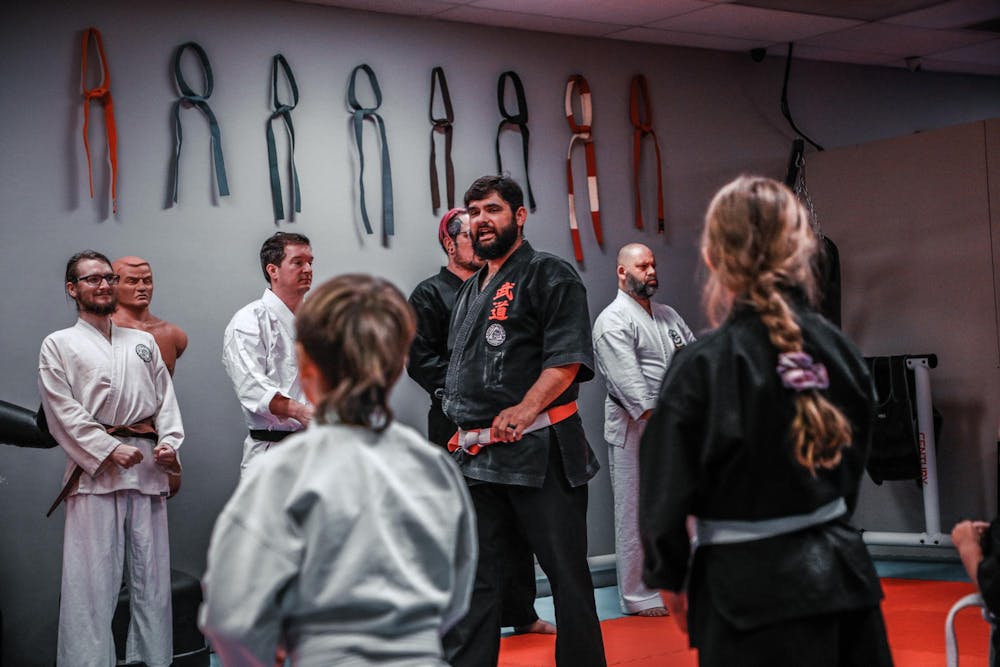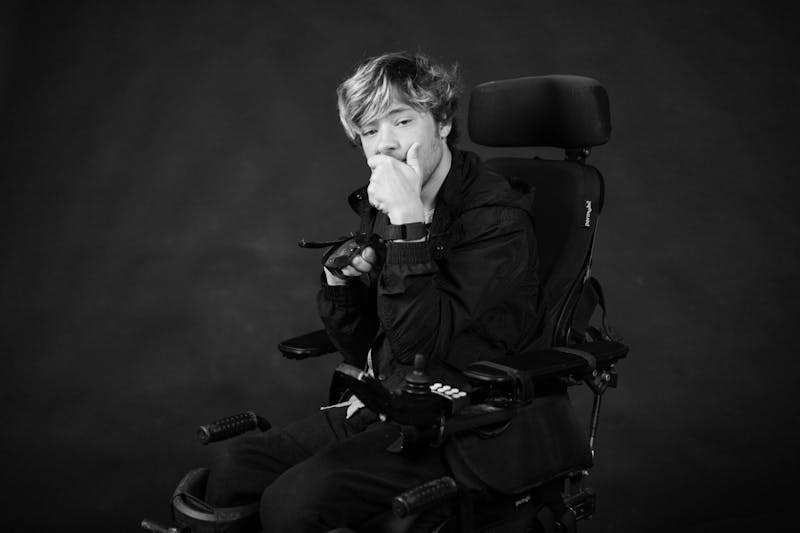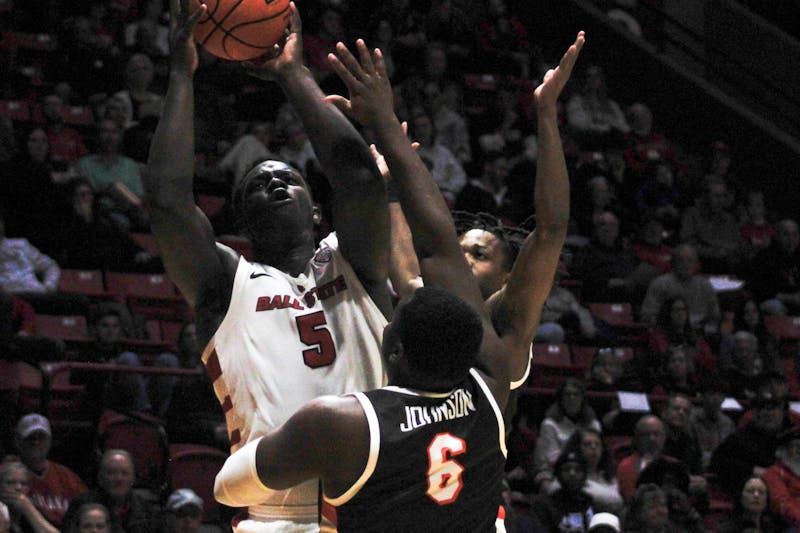White and Rymer’s Bushido Karate instructors train numerous students who need not just instruction on how to defend themselves but help navigating their own life. Chief instructor and owner Richard Rymer mentions many students start training at the dojo due to harassment surrounding Muncie Community Schools he describes as an epidemic.
As an eighth-degree black belt under the lineage of his recently retired instructor, Ron White, Richard teaches people experiencing bullying both martial arts and confidence. The caring discipline he received from White encourages Richard to provide generations younger than him the instruction they need as Richard did when he was their age.
“As early as my teens, I knew this was important to give to the next because I see kids when they come in, they have the same look in their eye I did,” Richard said. “They become a part of our family and that grew from that absence I had in my life that needed [to be] filled to now it’s my turn to be able to do that as well for somebody else.”
While not every student enters the dojo because of a troubling personal life, Richard indicates that’s the case for most.

“For a lot of kids that come in here, it’s not a game; it’s not a hobby; they’re coming here because this is a last resort,” Richard said.
Beyond bullying, Richard and assistant instructor Brayden Rymer said other students of all ages come into the dojo to compete, increase self-discipline, improve physical fitness or find a resolution to a certain issue impacting their life. Through training at the dojo, several students found surrogate father figures in the instructors.
“Some of our young men have never had a father figure, and some of our young women don’t know what a good father figure will look like,” Richard said. “So the dojo will fill the gap on these young people’s lives that will change the course from where they’re headed without that relationship, discipline and responsibility.”
During his youth, White played contact and combative sports because similar to several dojo students, he grew up bullied and vulnerable. Sports included boxing, judo, football, wrestling and karate.
“As early as nine years old, I knew there was a possibility that I had to do something to be able to defend myself,” White said.
As a martial artist who pioneered karate in the United States and trained with individuals in the country and internationally, White passed on his teachings and experiences to the Rymer family of what he believes martial arts is about, which extends beyond a simple pastime.
“There’s not a whole lot of people that can do what the Rymers do,” White said. "They have that genuine love for the art; not the hobby, but the art.”
Richard grew up, as he described, the bigger person who needed discipline in his life and a relationship with someone who could teach him that. Compared to White, Richard said his previous instructor disciplined him out of ego and fear instead of love. Richard developed a genuine connection built on trust with White when he started training with him, which is a type of relationship Richard said he fostered with his children.

“It was a discipline that I would accept because [White] actually wants me to be better,” Richard said. “Even through all the years, and me and him have been through so much together, I've always felt me and him were in it together.”
With Richard’s own family, White witnessed the discipline he passed on develop Richard into both the martial artist and the family man he is today. To White, he saw Richard take responsibility for both his work and personal life.
“He’s like my son,” White said. “I love this man with all my heart because I’ve watched him grow, not only as an adult in martial arts, I watched how he raises his kids, how he loves his family, he loves his wife dearly.”
White’s martial arts philosophy involves not doing one’s best, but doing what’s required in both fighting and personal life situations. For example, what’s best for Richard as a husband and White as a family man, according to White, is doing what’s required in each individual role.
“Every student out there that tests for a black belt did their best, but did they do what was required,” White said. “We can’t look at ‘we’re gonna just do our best and get through life,’ it’s not that easy, you have to do what’s required.”

Master Richard Rymer works with one of his students during a class Nov. 28 at White and Rymer Bushido Dojo. Andrew Berger, DN
Richard’s family also partake in martial arts and even instruct classes at the dojo, including his 20-year-old son Brayden. Unlike White and his father, Brayden was surrounded by martial arts and character discipline his entire life.
Richard’s philosophy with parenting when raising kids was to expect his children to take the path of least resistance, so he believed it was beneficial to raise them to practice martial arts. Brayden was raised on what he claims to be an overwhelming level of discipline compared to people his age.
“Starting so young, I don’t have any thoughts of anything besides being a martial artist,” Brayden said.
Despite living life knowing nothing but how to be disciplined in a martial arts setting, Brayden still relates to fellow martial artists he teaches, who might not share that same discipline from experiences of his own and experiences he’s witnessed in others.
“As an instructor, I am a friend to everyone here,” Brayden said. “Most people I do talk to will, because I am a person you’re supposed to trust, spill it all out to me, so I’ll get a lot of people give me a whole rundown on what’s going on.”

In a dojo where various walks of life are trained, according to Brayden and Richard, ranging from different races, economic standings, people experiencing homelessness, older people who are not mobile and more, practicing martial arts brings a community Richard describes as a family.
“Even in the dojo, the underprivileged kid doesn’t get treated better than the kid who came from a wealthy background,” Richard said. “Everybody's the same in the dojo, everybody’s held to the same standards.”
A purpose of bringing martial arts to all walks of life in Muncie from White’s perspective, is encouraging discipline and growth to a community severely needing it.
“The community needs martial arts in those schools, worse or more than they know because there's a lot of kids we keep from getting incarcerated,” White said.
Despite retiring from the business side of martial arts and teaching at the dojo, White teaches private sessions and works out constantly, as he claims he’ll never retire from martial arts. Richard currently prepares his son Brayden, so when he gets older he’ll have a bigger leadership role in the dojo.
The legacy White left behind in the White and Rymer’s Bushido Karate was starting a family of martial artists continuing to grow and educate others in a family-owned business. To White, the Rymers exhibit a family of martial artists spanning current and future generations.
“They exemplified what I’ve always wanted to see in a martial arts family: dad, son, wife, daughter, grandkids and it goes on and on,” White said. “That’s where the legacy lies; not just me, but the legacy lies in those forefathers of those people that went before you.”
Contact Zach Gonzalez with comments via email at zachary.gonzalez@bsu.edu or on Twitter @zachg25876998.





The Daily News welcomes thoughtful discussion on all of our stories, but please keep comments civil and on-topic. Read our full guidelines here.